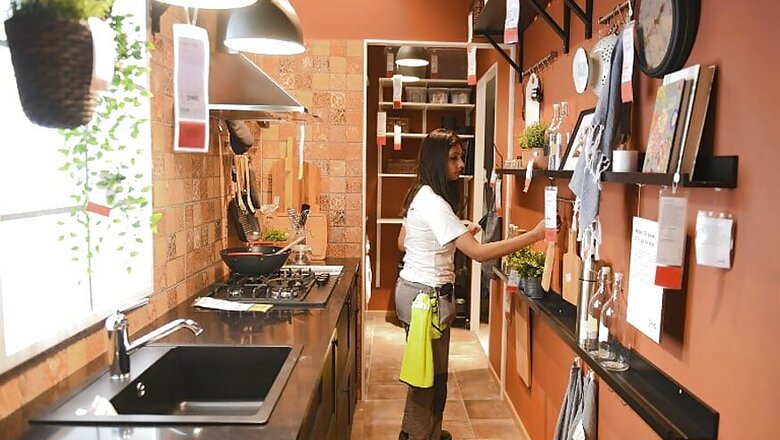
views
Due to the Covid-19 lockdowns worldwide, people are spending more time in their homes than they probably ever have. Reports from around the world indicate that the lockdowns have impacted women significantly, leading to a massive increase in domestic violence. However, an insidious effect of the lockdown has gone unnoticed — impediment of women’s personal liberty and privacy.
It is a known fact that women have always struggled to have their personal liberty and privacy. Many women worldwide have written first-hand accounts of facing the ‘me-time’ conundrum.
Brigid Schulte, a Pulitzer winner journalist, terms the lack of personal time as a woman’s greatest enemy. It is no surprise then that ever since India announced the nationwide lockdown on March 24, personal liberty and privacy of Indian women has taken a hit.
Our conversations with multiple Indian women living in joint families revealed that this lockdown has led to personal liberty becoming a site of contestation in households, visiblised in the form of restrictions on personal time and an increase in household responsibilities.
The discussions further revealed that the role of mothers-in-law is significant in context of these issues. We specifically spoke to women in joint families for this story as a 2015 research study by Professor Sisir Debnath of IIT Delhi indicates that household structure impacts female autonomy whereby women in nuclear households enjoy greater decision-making power, freedom of movement outside the home and participation in jobs, when compared to their counterparts living in joint families.
With a three-month pregnancy, Disha Yadav, a 28-year-old woman from Delhi, has been burdened with care work responsibilities since the lockdown. She tells News18, “Before the lockdown, my office routine was such that I could accommodate household chores and other errands assigned by my in-laws. However, the lockdown has pushed me to meet the dietary, and hygiene requirements of everyone in the house.”
Srishti Dixit, a professional from the tourism industry — which remains completely shut in the context of Covid-19, is facing similar challenges. She said, “My husband, an officer in Indian Navy, cannot come home because of the lockdown, therefore, I am a subject of my in-laws’ commandments. My mother-in-law often goes out to see her friends in the society and so does my father-in-law, however, my mobility and bodily movement is dependent on whether they will allow me or not.”
Even if Dixit goes for a stroll in their society’s park, she has to come back at a particular time to cook dinner else she is chided and taunted, she adds.
While Yadav thought the pregnancy would allow her to explore her personal space, the lockdown affected her significantly. “I only get two hours of ‘me-time’ to rest, read or even think about what’s happening and that too, only because of the baby,” she added. Yadav’s comments make it clear that had it not been for the pregnancy, she would not have any personal liberty and time for herself.
The Tricky Relationships with Mothers-in-law
A prominent recurring theme in our conversations was the significance of mothers-in-law in the lives of these women. Dixit and Yadav specifically told us that they have more conflicts with their mothers-in-law as compared to fathers-in-law.
Yadav’s mother-in-law works as a teacher in a government school and seeks help from Yadav for her online work. She added, “I have to continuously assist her in understanding new technology — be it making groups on WhatsApp or explaining Zoom video formats, which takes away a lot of my personal time.”
Dixit has similar concerns. When asked if her mother-in-law contributes to household chores, she told us, “While earlier my mother-in-law took care of breakfast and lunch, now I am responsible for preparing all three meals. Although my father-in-law is ‘cooperative’ and wants to share responsibilities, my mother-in-law does not let him or says we also did all these chores in our times, so my daughter-in-law is not the only one.”
It is evident from these conversations that in addition to the direct effects of Covid-19 crisis (drop in income and employment), women are bearing the brunt of Covid 19’s indirect effects more than men, which could be long lasting.
An April 2020 working paper published by the National Bureau of Economic Research, US substantiates this argument. The paper argues that the employment drop related to social distancing measures has a large impact on sectors with high female employment shares. Furthermore, closures of schools and daycare centers have massively increased childcare needs, which has a particularly large impact on working mothers. While Yadav and Dixit aren’t mothers yet, the lockdown has exacerbated the gendered division of labour for them in an unequal and unfair sense.
While Dixit and Yadav’s experience with their mothers-in-law is tricky, Sadhika Tiwari, a 30-year-old IT analyst from Delhi, is happy with hers. She said, “I do have my room and space to pursue what I want to in this lockdown. The fact that my mother-in-law is working in a school as a principal makes her empathise and understand my working burden.”
Tiwari is the younger daughter-in-law in her family, which has designated household tasks among all members. She added, “My mother-in-law handles her schoolwork and other domestic chores, so does my elder sister-in-law and I take care of domestic errands for me and my husband.”
In another city, women forging feminist solidarities amidst lockdown
While we were looking for women to share their lockdown experiences, we came across a unique example of how some Muslim women in Lucknow are leveraging this crisis situation to forge feminist solidarities.
Sahiba Ahmed, a 27-year-old Muslim woman from Lucknow says that lockdown has provided an opportunity for daughters-in-law in our house to bond with each other.
She said, “The bonding has really increased among them not just in our household, but also with other daughters-in-laws in the neighbourhood. They have more time and space to explore their creative energies in dancing together, making Tik Toks, cooking together and even discuss ways to navigate patriarchal spaces.
It is no surprise then that Tik Tok has been the 2nd most downloaded app in India — after Zoom — between 25 March and 10 April, according to a report by The Print.
Some media portals have reported similar stories on how families, which didn’t have much time earlier due to long working hours, are bonding amongst themselves in this lockdown. Ahmed further told us that these women are also discussing issues around tackling patriarchy, finding solutions and it feels heartening for her to hear them having very progressive conversations. “Earlier, they didn’t have much time due to household labour, familial responsibilities and other work but these conversations can make a change.”
(Devanik Saha is a freelance researcher with GOVERN and a PhD scholar at IDS, UK. Manisha Chachra is a researcher with GOVERN and a PhD scholar at JNU, Delhi.)




















Comments
0 comment